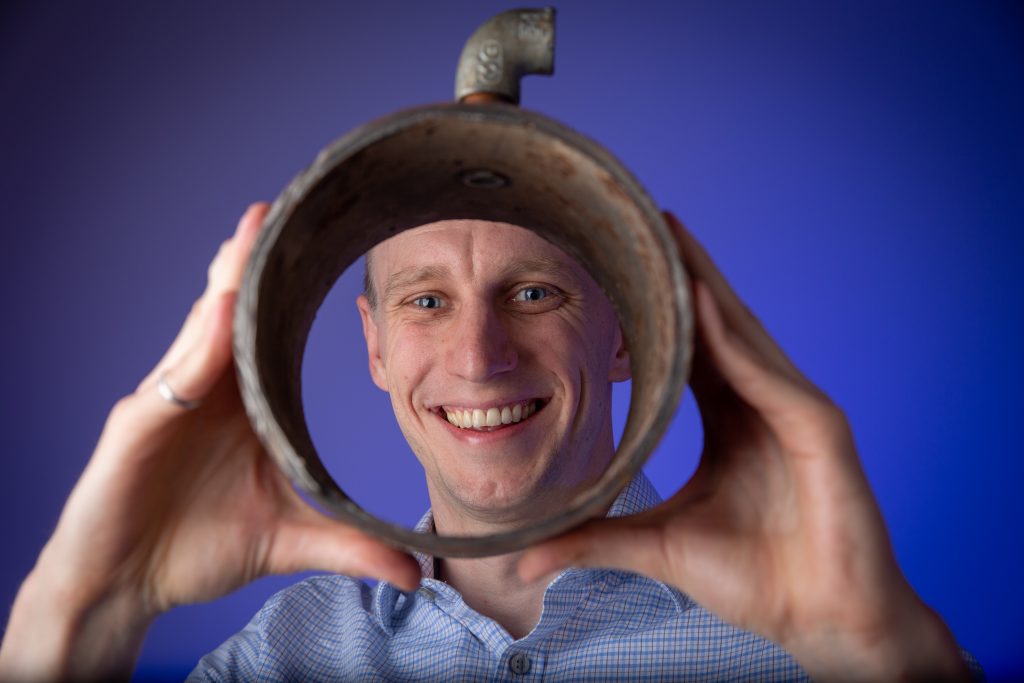
In January, the Department of Civil & Mineral Engineering welcomed Assistant Professor David Taylor, a professor in Civil and Global Engineering, cross appointed with the Centre for Global Engineering (CGEN) in the Institute for Studies in Transdisciplinary Engineering Education & Practice (ISTEP).
Taylor’s research applies competencies from both civil and mechanical engineering. After completing his undergraduate degree in Engineering Science at U of T, Taylor continued his research at MIT, earning a Masters and Doctorate in Mechanical Engineering. Taylor’s key focus concerns understanding and improving intermittent water distribution systems in India.
What is the focus of your research?
How is it that 21 per cent of the world’s water pipes aren’t usually filled with water?
To save water and energy, some water distribution systems are regularly turned off; these water systems serve one billion people, yet are poorly understood. In India, for example, the average water distribution network operates for an average of only four hours a day; in Delhi, where I do much of my fieldwork, water is supplied two to three hours per day.
In cities with intermittent water systems, residents typically store water in their homes. Yet not all residents have the capacity to store a day’s worth of water. So, it’s critical to understand how the duration of water supplies affect residents. I look at this issue and how it relates to megacities in the global south, often in India.
Both the human right to water and one of the sustainable development goals are global commitments emphasizing that people need access to water. But how many hours per day, or days per week, does a water system need to be on for it to have fulfilled the human right to water? My research develops new models of and theories about intermittent water systems to help answer this type of question.
What excites you most about your research?
I think being very passionate about what you do is often a happy accident, but what excites me most about my research is the huge need for rigorous, thoughtful research into how these systems operate. Almost a billion people use intermittent water distribution networks on a daily basis, yet there might only be 15 researchers focused on how they work. In terms of research-to-impact ratios, there’s a high need for more people to think about how these systems work, how we should fix them, and how we should operate them. It’s exciting to be a part of a solution that has the potential to impact the lives of so many.
What are you most looking forward to in your new role at the University of Toronto?
I’m really looking forward to being in a cross-disciplinary role. Rather than having to take my global engineering research and mainstream it in civil engineering, or take my civil engineering research and consider it as global engineering, I get to do both, which makes me feel incredibly lucky. And I also get to work with colleagues who excel at both of those things, and students who want to do both of those things, too. I’m really excited about having colleagues in the department who focus on the traditional domains of water infrastructure and water treatment. With water distribution research, people ultimately care about the health impacts and the water quality, so it’s great to have colleagues focused on that.
What do you hope to accomplish in the next five years?
In five years, if I understood more about intermittent water supplies that would be a major accomplishment. The private sector and the consulting sphere both have some embedded interests in fixing these systems, but the status quo for how to fix these systems has not been fully evaluated, yet. I would love to gain some traction in getting some of these companies and consultants to think harder about what they’re doing and why they’re doing it.
In five years, I would love to have a way for water utilities to model their intermittent supplies. So for example, a city like Mumbai that has 15-20 million people, has a water system that turns on for maybe four hours a day and a team of a hundred engineers. None of the engineers have a computer program that can tell them how the system will respond if they change their pumping schedule, have a drought, or fix many of their leaks. These utilities are forced to manage their systems by trial and error. Yes, someone at the utility will have a program that tells them what the system should have done if it had been operated continuously, but I still think that having tools that accurately makes predictions about the current system’s behavior would be extremely useful.
What’s one thing about you that would surprise us?
I love windsurfing. I’m currently trying to land a forward loop – like a front flip. I used to windsurf on the Charles River in Boston, so I have yet to determine where I’ll practice in Toronto. I used to teach at Cherry Street Beach when I was in undergrad, so that’s always something to consider, but it doesn’t usually get windy enough for my liking.